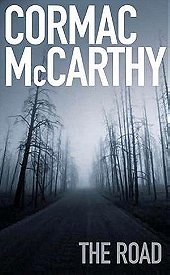Stealing from Publishers Weekly found via Amazon.Com, here is a brief overview of the book:
---
Violence, in McCarthy’s post apocalyptic tour de force, has been visited worldwide in the form of a “long shear of light and then a series of low concussions” that leaves cities and forests burned, birds and fish dead, and the earth shrouded in gray clouds of ash. In this landscape, an unnamed man and his young son journey down a road to get to the sea. (The man’s wife, who gave birth to the boy after calamity struck, has killed herself.) They carry blankets and scavenged food in a shopping cart, and the man is armed with a revolver loaded with his last two bullets. Beyond the ever-present possibility of starvation lies the threat of roving bands of cannibalistic thugs. The man assures the boy that the two of them are “good guys,” but from the way his father treats other stray survivors the boy sees that his father has turned into an amoral survivalist, tenuously attached to the morality of the past by his fierce love for his son.
---
I was asked the question “What book have you read that effected your life?” soon after reading this. My answer was “Middlesex” by Jeffrey Eugenides, because the characters have stayed with me for so long. I think this book will replace that answer.
As would be expected of a post apocalyptic novel, the story is bleak. The landscape, the characters (except the boy sometimes), the feel of the story, even the way the book was printed, with very little punctuation, other then periods at the end of sentences. It’s all says “bleak” in a strong way. (Though the lack of punctuation, including quotes to know if someone is saying something, was kind of annoying: either these authors are too artsy or their editors/publishers are too lazy.) But through this very bleak setting, there is some hope. And that hope lies in the love that the man feels for his son. Even though he doesn’t see a lot of hope for their future, and especially his own, even fighting with the thoughts of a mercy killing of his son and his suicide, he still looks out for his son, and does everything for his survival. He keeps pushing ahead, to help his son survive and give him something for the future. Even when the things that he wants to do scare his son.
It is also tough for the man to do some of the things he needs to for their survival. He feels the sting of his son’s scolding when they don’t help those around them. As an adult, I can see some of the reasons for his actions. In a setting such as this book it would be hard to trust anyone. How do you teach that to your son who is always wanting to help those around, that to better their chance of survival sometimes you have to only take care of yourself and not get involved with others? Yet you can tell that the father still wants his son to have such feelings, wanting him to give of himself and not lose that hope in humanity. As much as you can read that in the story, there could have been more of that played out in the father’s thoughts. It’s a touching and yet sad story.
I have read many write ups and reviews of McCarthy’s work, calling him the second coming of William Faulkner. I even read something on Wikipedia about this book saying that it is based on comments Faulkner made during his Nobel acceptance speech. There are some that say there are heavy religious overtones or parallels. Well, I haven’t read any of Faulkner’s work. And I missed some of the religious references. But I did read a book that effected me, because I saw the boy as a 6 to 8 year old. And I envisioned Nigel at that age. And I thought about how much I love my son, and what it means to me that I give him hope that the world around him won’t crumble. So no matter what I missed in this story, it still hits me where it should.
9/10
 Login
Login